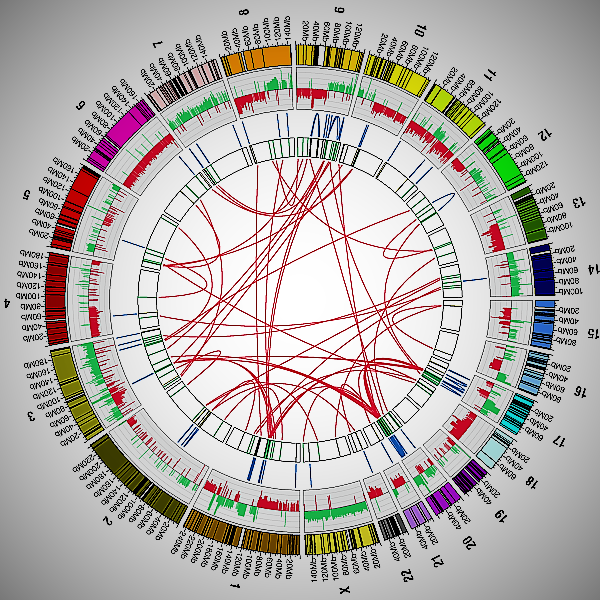Researchers in the Human Genetics Institute of New Jersey’s Cancer Genomics Program include scientists and clinicians who are investigating the genomic causes, treatments and cures of cancer. Although modern medicine has allowed for faster and more accurate diagnosis, half of all men and one-third of all women in the US will develop cancer during their lifetimes (http://www.cancer.org/cancer/cancerbasics/what-is-cancer). Traditional pathology and radiology techniques commonly used in cancer diagnosis identify and classify tumors within a given tissue (e.g., breast, prostate) as being identical. This method most frequently results in conventional treatments based on tissue of origin. Through molecular genetics studies, researchers have gained insights into the relationship between cancer cell origin and tumor behavior. For example, cancer in the same tissue from two different people may be unique on a molecular level while two different tissues in separate people may be found to have molecularly similar cancer types. Researchers in the Cancer Genomics Program are revolutionizing the approach to cancer treatment by developing and implementing diagnostic tools to identify specific, molecular abnormalities in cancer cells of individual patient tumors. In collaboration, scientists and clinicians at Rutgers (Human Genetics Institute of New Jersey and Cancer Institute of New Jersey) are defining the molecular mechanisms of cancer, accelerating genomics science and technology development, and efficiently translating genomics data to improve cancer prevention, early detection, diagnosis and treatment. Information obtained through state of the art diagnostics allows patients and physicians to partner in choosing the most effective individualized treatment regimens customized to the genetic abnormalities of their tumor, a novel diagnostic protocol referred to as precision medicine. This new model creates treatment options based on the molecular characterization of each cancer instead of organ of origin. Through such diagnostics, patients obtain more effective therapy and avoid costly, less effective treatments that often include unpleasant and dangerous side effects.
One initiative of the Cancer Genomics program is to perform targeted genomic analyses of resistant and rare cancers to identify novel treatment strategies for adult and pediatric patients in a clinically practical timeframe. This work is being performed in the new Clinical Genomics Laboratory at RUCDR Infinite Biologics, HGINJ’s bioprocessing and biostorage facility. Scientists are using whole genome sequencing, whole exome sequencing, and RNA sequencing to identify novel, clinically relevant genomic changes in human cancers to accelerate new translational science discoveries. The integration of bioinformatics and molecular genetics allows the most pressing problems in cancer, such as resistance to treatment, to be addressed and requires a strong interface between systems biology, technology, computational analyses, and the clinic. Researchers continue to develop novel analytical approaches to genomic data analysis in order to better understand the molecular state of cancer cells, to improve the assessment of genetic risk factors and to further the development of individualized, genomic-based cancer care. Cancer diagnostics based on genomic testing is a dynamic and accelerating field, which is driven by the rapid accumulation of data and new discoveries. Researchers in the Cancer Genomics Program are at the forefront of this innovative approach.

